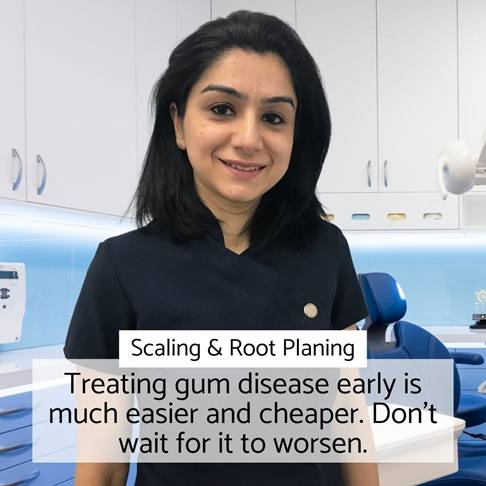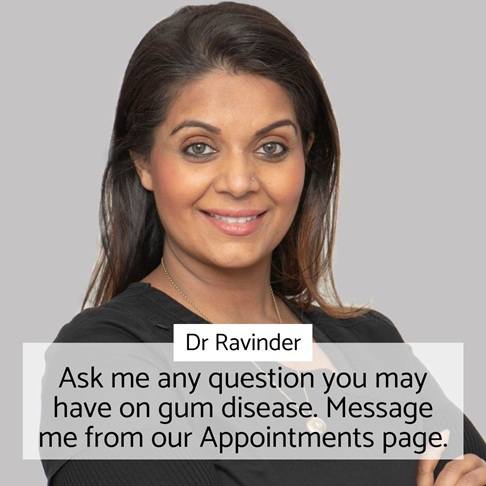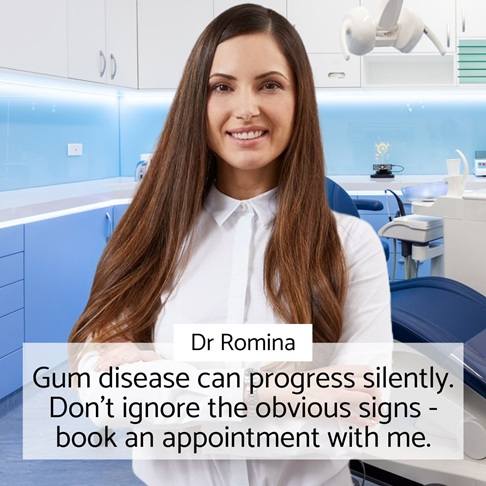
Periodontal Treatment - Expert Gum Disease Care In London
Suffering from gum disease? Book an appointment for periodontal treatment with one of our dentists.
Periodontist Treatment For Gum Disease In London From £205
Why Get Periodontal Treatment For Gum Disease?
Periodontist care for your gums
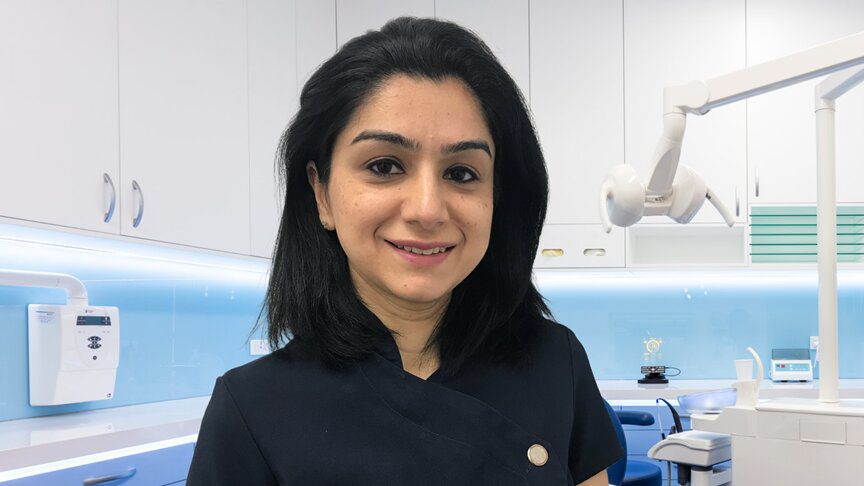
Gum disease is one of the most common dental issues in London. The earlier you treat it, the easier it is to treat.
Avoid pain and discomfort – early treatment stops bleeding, swelling, and sensitivity before they develop into serious oral health problems.
Prevent tooth loss – gum disease destroys bone and tissue, causing teeth to loosen and eventually fall out if untreated.
Protect overall health – it’s linked to heart disease, diabetes, and more—treating it reduces risks to your general health.
Save time and money – treating gum disease early avoids costly, complex procedures like surgery or tooth replacement later on.
At Whites Dental, we have some of London’s most experienced private dentists and periodontists offering gum disease periodontal care from our two location in Central London. Get in touch to book an appointment with them to address you gum health.
Our W2 dentists near Paddington are a short walk from Bayswater, Paddington Station, Notting Hill & Edgware Road. Oxford Street is just a stone throw away.
Our SE1 dentists near London Bridge are walking distance from Southwark, London Bridge, City Of London, Southbank & Elephant and Castle.
Make An Enquiry
Types Of Periodontal Treatments For Gum Disease
Non-surgical periodontal treatments
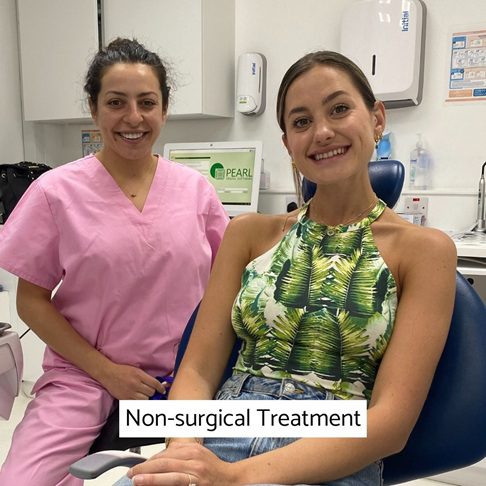
Non-surgical periodontal treatments aim to control infection and restore health of your gums without resorting to surgery. This includes professional cleanings, improved oral hygiene routines, antibacterial rinses, and deep cleaning procedures like scaling and root planing to remove plaque and reduce gum inflammation.
Surgical periodontal treatments
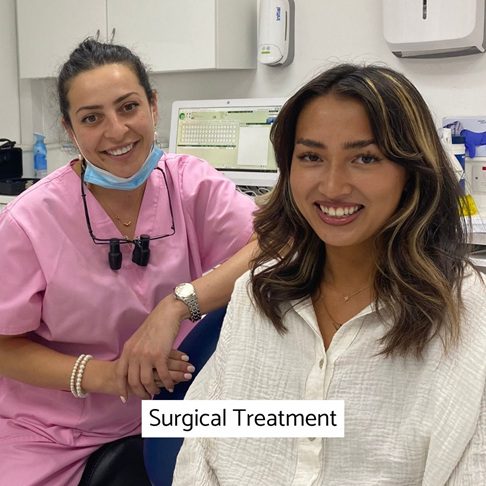
Surgical periodontal treatment for gum disease is used in advanced cases where deep pockets or bone loss are present. Procedures include flap surgery, bone grafts, and tissue regeneration to restore support, eliminate infection, and preserve natural teeth when non-surgical methods are no longer effective.
Our Three Stage Periodontal Treatment Process With A Periodontist
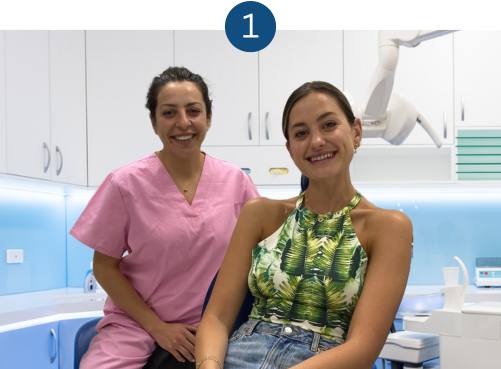
Exam & Assessment
Our periodontal treatment for gum disease starts with an examination. The dentist will assess your gum health and provide you a treatment plan with clear prices. This will include a 6 point pocket chart.
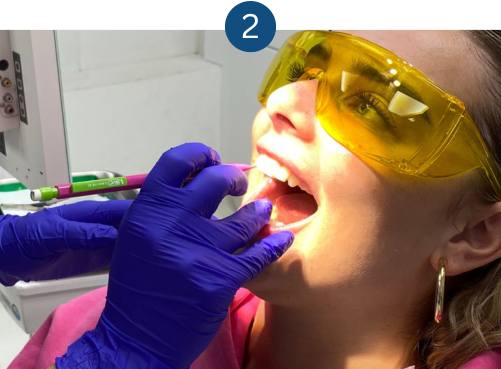
Periodontal Treatment
Once you are happy to proceed, we will book you for treatment appointments with the periodontist (usually 2-4 appointments are needed to complete your periodontal treatment).

Stabilisation
Once your gums have been treated, we will book you for regular sessions with the hygienist (usually 3 monthly) to stabilise your gums so they remain healthy.
How Much Does Periodontal Treatment For Gum Disease Cost In London?
If you are wondering about how much does periodontal treatment cost – prices for periodontal treatment for gum disease with our dentists and periodontists in London is noted below.
|
Examination |
£65 |
|
6 Point Pocket Chart |
£100 |
|
Root Planing |
from £180 |
|
Debridement |
from £150 |
|
Gum disease treatment |
from £205 |
Meet Our Periodontal Experts In London
At Whites Dental, both Dr Romina and Dr Ravinder are very experienced dentists. Dr Romina has been treating gum disease for 15 years and Dr Ravinder has been providing periodontal care for over 18 years. Dr Ravinder is also a very experienced dental surgeon. Our surgery rooms are very modern, with the latest state of the art equipment. These are some of the advantages of having periodontal treatment with our dentists and surgeons at Whites Dental.
Book A Periodontal Appointment For Gum Disease
Feel free to get in touch with our reception team to book an appointment for gum disease treatment with our periodontists in London.
What Is Periodontal Treatment (Or What Is Gum Disease)?
Periodontal treatment means treating a disease called periodontitis – which is gum disease. Gum disease is an infection of the gum tissue that supports and surrounds your teeth. It starts with build up of bacteria and plaque along the gum line, leading to inflammation and bleeding gums. If left untreated, the disease can progress from its mild form (gingivitis) to it’s more severe form (periodontitis), causing bone loss, gum recession and even tooth loss.
Signs and symptoms of gum disease
Swollen or inflamed gums
One of the first and most reported symptom of gum disease is swelling of the gums. Or inflammation in other words. They may appear red, puffy, and feel tender to the touch. Inflammation is your body’s natural response to infection, and in the case of gum disease, it’s usually caused by a build up of plaque and bacteria along the gum line.
Bleeding gums
Bleeding when brushing or flossing is a key indicator of early gum disease (gingivitis). Regular bleeding is a sign that the gum tissue is inflamed and needs attention. Healthy gums should not bleed during routine cleaning.
Bad breath or bad taste
Frequent and ongoing bad breath (also called halitosis) or a frequent bad taste in the mouth is often associated with gum disease. This is usually caused by the build up of bacteria ( that release foul-smelling gases and toxins) associated with gum disease in the mouth.
Gum recession
As gum disease progresses, the gum tissue can start to recede or pull away from the teeth, making the teeth look longer than usual. As the gums recede, they expose the roots of the teeth, which causes sensitivity.
Tooth sensitivity
Roots of the teeth that get exposed due to receding gums can often lead to higher sensitivity to hot and cold food and drinks. You can also experience increase sensitivity to acidic or sweet foods and drinks.
Loose or shifting teeth
In advanced stages of gum disease (periodontitis), the supporting structures around the teeth begin to break down. Teeth can start to loosen or shift. Bite alignment can also change, making it uncomfortable to chew or close your mouth properly.
Common causes of gum disease
Plaque build up (poor oral hygiene)
Plaque, which is a thin, sticky film of bacteria, if it is not removed every day with a good oral hygiene regime, hardens and forms tartar – leading to gum inflammation and early signs of gum disease.
Smoking and tobacco use
Smoking is known to weaken the immune system; it also reduces the flow of blood to your gums. Both these factors increase risk of infection to the gums. Smoking is also known to hide the early signs of gum disease.
Hormonal changes
Shifts in hormone levels during puberty, pregnancy or menopause can make gums more sensitive. This shift in hormone levels then increases the changes of gum inflammation and gum irritation.
Medical conditions and medications
Conditions like diabetes and medications that reduce saliva flow make it harder to fight gum infections. A dry mouth environment encourages bacterial growth.
Genetics and family history
Some individuals are genetically predisposed to gum disease. Even with good oral care, they may develop issues without regular dental monitoring.
Poor nutrition and vitamin deficiency
Lack of nutrients, especially vitamin C, weakens gum tissue and immune response. This slows healing and makes gums more vulnerable to infection.
Stress and weakened immune response
Chronic stress lowers your body’s ability to fight infections. This can allow plaque bacteria to spread and worsen gum inflammation.
Stages Of Periodontal Disease Or Gum Disease
Stage 1: Gingivitis

Gingivitis is the early stage of gum disease. It occurs due to build up of plaque on the gum line. It leads to red, swollen, and bleeding gums but is usually painless. With a good oral hygiene routine and regular hygienist cleaning, gingivitis is a reversible condition. However, if gingivitis is not treated, it progress to a more serious gum condition called periodontitis.
Stage 2: Periodontitis
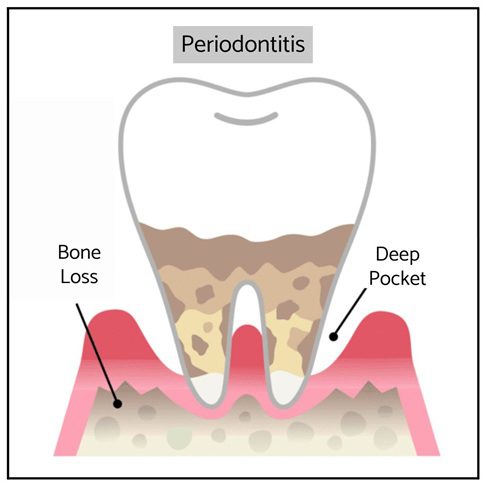
Periodontitis is an advanced stage of gum disease that occurs when untreated gingivitis spreads below the gum line. It causes inflammation, gum recession, bone loss, and loose teeth. Without treatment, it can lead to tooth loss and impact overall health. Periodontitis requires professional care to manage and prevent further damage.
Periodontal Aftercare For Gum Disease
Immediate aftercare following periodontal treatment
After periodontal treatment, it’s important to follow strict oral hygiene practices to aid healing of your gums. Patients should gently brush and floss as advised, avoid hard or sticky foods and rinse with any prescribed mouthwash to reduce bacteria and protect treated gums.
Long term maintenance and follow up
Long-term aftercare focuses on preventing gum disease from recurring. Regular periodontal check-ups every 3–6 months, combined with professional cleanings with the hygienist, support gum stability, while consistent at-home care helps maintain results and safeguard overall oral health.
Periodontist Treatment - Frequently Asked Questions
What's the difference between gingivitis and periodontitis?
+How do plaque and tartar cause gum disease?
+How does a periodontist treat gum disease?
+Do you need a referral to see a periodontist?
+How often should you see a periodontist?
+Finding Our Periodontal Clinics In London
Waterloo dental clinic (SE1)
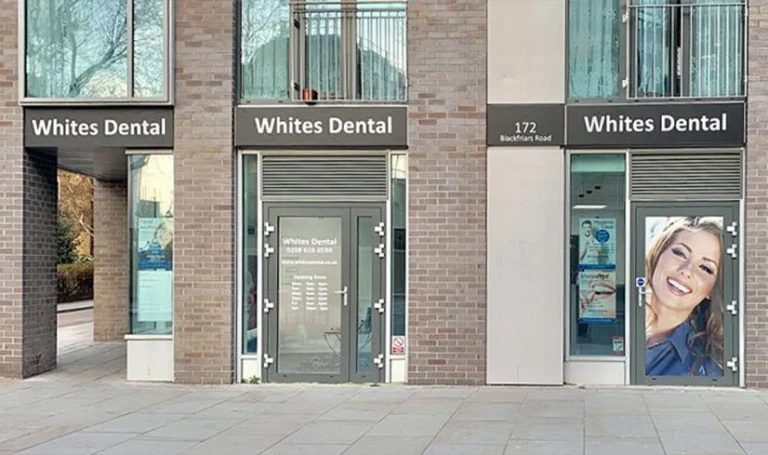
Whites Dental Waterloo
172 Blackfriars Rd, London SE1 8ER
020 8616 0590
Waterloo dentist clinic in SE1 – located right next to Southwark Underground station, the dental clinic is walking distance from London Bridge Station, Borough Market, Southbank and Elephant and Castle.
Marble Arch dental clinic (W2)
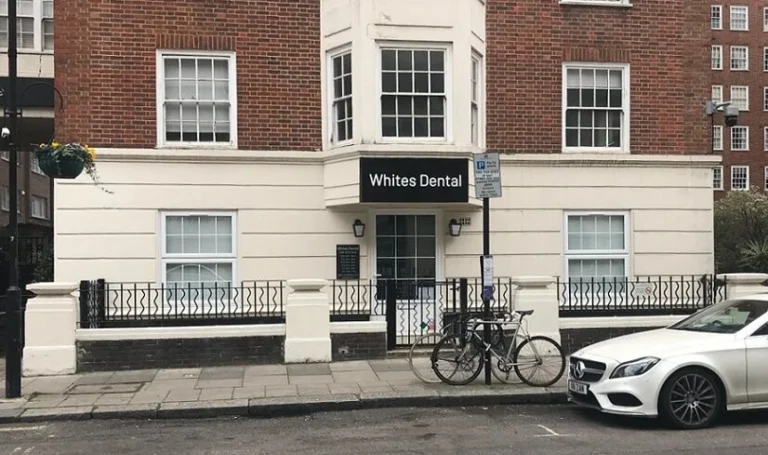
Whites Dental Marble Arch (W2)
52B Kendal St, St George’s Fields, London W2 2BP
020 3576 2325
Marble Arch dentist clinic in W2 is a short walk from Paddington Rail Station, Hyde Park, Oxford Street, Maida Vale, Bayswater, Marylebone& the West End.
